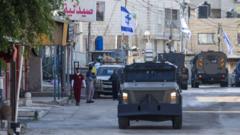Israeli military actions in Jenin have left nine Palestinians dead and many injured, igniting fears of sustained violence as tensions rise in the West Bank following a ceasefire in Gaza.
Nine Palestinians Killed in Israeli Military Operation in Jenin

Nine Palestinians Killed in Israeli Military Operation in Jenin
Violence escalates in the West Bank as Israeli forces carry out a significant operation in Jenin, drawing widespread condemnation.
Nine Palestinians were killed, and around 35 others injured by Israeli forces in a major military operation conducted in Jenin, a city noted for its association with Palestinian armed groups. The Palestinian health ministry confirmed the casualties, which followed bombardments and the deployment of a considerable number of troops, helicopters, drones, and armored vehicles in the area.
Israeli Prime Minister Benjamin Netanyahu remarked that the operation, called "Iron Wall," was a crucial step to combat what the country perceives as terrorism in Jenin. He stated that Israel would continue its measures to fortify security within the West Bank and confront threats believed to come from Iranian-backed groups in the region.
The operation in Jenin came merely three days after a ceasefire was established in Gaza, indicating a potential resurgence of hostilities away from the coastal enclave. The governor of Jenin, Kamal Abu al-Rub, described the situation as an invasion, noting the rapid and aggressive deployment of Israeli forces and hardware, including Apache helicopters.
Wafa news agency reported that Israeli troops had effectively besieged Jenin camp and dug up streets with armored bulldozers. The director of the local hospital stated that medical personnel were among those wounded in the violence. Eyewitness accounts shared by Jenin's security officials described incidents where Israeli soldiers opened fire on both civilians and security personnel.
The Palestinian Authority's Premier, Mohammed Mustafa, issued a denunciation of the operation, calling it part of a broader pattern of Israeli aggression towards Palestinians. In response to the military actions, both Hamas and Palestinian Islamic Jihad urged Palestinians to ramp up their resistance against Israeli forces.
The uptick in violence in the West Bank aligns with a broader pattern of conflict following Hamas's attack on Israel on October 7, 2023. Israeli military strategies have intensified post-attack, aiming to avert further acts of violence against Israelis. The situation remains tense, with additional violence reported from Israeli settler clashes in nearby communities.
In the West Bank, recent actions have elicited anger, particularly surrounding the U.S. administration's recent policy shift, which lifted sanctions against Israeli settlers previously targeted for aggression. Claims of discriminatory practices continue to surface, with local leaders warning that the new policies serve as encouragement for further violence against Palestinians.
As clashes between settlers and Palestinians soar, the ramifications of the ongoing violence in Jenin and broader Palestinian territories cast a grim shadow over the prospect of peace in the region.
Israeli Prime Minister Benjamin Netanyahu remarked that the operation, called "Iron Wall," was a crucial step to combat what the country perceives as terrorism in Jenin. He stated that Israel would continue its measures to fortify security within the West Bank and confront threats believed to come from Iranian-backed groups in the region.
The operation in Jenin came merely three days after a ceasefire was established in Gaza, indicating a potential resurgence of hostilities away from the coastal enclave. The governor of Jenin, Kamal Abu al-Rub, described the situation as an invasion, noting the rapid and aggressive deployment of Israeli forces and hardware, including Apache helicopters.
Wafa news agency reported that Israeli troops had effectively besieged Jenin camp and dug up streets with armored bulldozers. The director of the local hospital stated that medical personnel were among those wounded in the violence. Eyewitness accounts shared by Jenin's security officials described incidents where Israeli soldiers opened fire on both civilians and security personnel.
The Palestinian Authority's Premier, Mohammed Mustafa, issued a denunciation of the operation, calling it part of a broader pattern of Israeli aggression towards Palestinians. In response to the military actions, both Hamas and Palestinian Islamic Jihad urged Palestinians to ramp up their resistance against Israeli forces.
The uptick in violence in the West Bank aligns with a broader pattern of conflict following Hamas's attack on Israel on October 7, 2023. Israeli military strategies have intensified post-attack, aiming to avert further acts of violence against Israelis. The situation remains tense, with additional violence reported from Israeli settler clashes in nearby communities.
In the West Bank, recent actions have elicited anger, particularly surrounding the U.S. administration's recent policy shift, which lifted sanctions against Israeli settlers previously targeted for aggression. Claims of discriminatory practices continue to surface, with local leaders warning that the new policies serve as encouragement for further violence against Palestinians.
As clashes between settlers and Palestinians soar, the ramifications of the ongoing violence in Jenin and broader Palestinian territories cast a grim shadow over the prospect of peace in the region.























